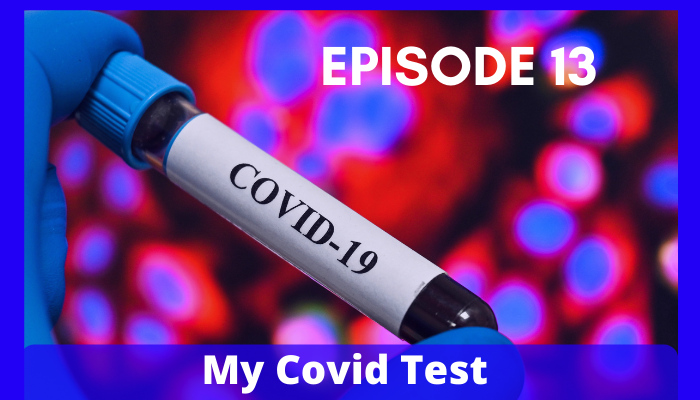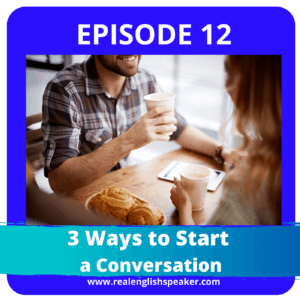
In this episode you’ll learn English vocabulary for Covid!
I tell you a true story about my experience having a test for Covid-19 in the sometimes crazy and bizarre suburb of Kings Cross in Sydney, Australia.
I talk about the lockdown experience in Australia, pop up Covid-testing clinics, being shouted at from the street while getting a test and the swab up the nose! Ugh!
You’ll learn phrases such as ‘scamdemic’, ‘first and second wave’, ‘incubation period’ and ‘asymptomatic’.
This is living Life in English!
PODCAST VOCABULARY LIST
Listen to the podcast and try to hear the following vocabulary and expressions;
- Pandemic
The Covid pandemic has spread across the whole world. - Lockdown
In Australia we were in lockdown from March. - Mandatory
It was not mandatory to stay in lockdown. - Essentials
We could only go out for essentials. - luxuries
Luxuries such as going out to a bar or going out for fun was not allowed. - self-isolate
If you had symptoms or were not feeling well you had to self-isolate. - to flatten the curve
This was all in an attempt to flatten the curve. - “Things were looking up”
- The first wave
- The second wave
- “There was a spike in cases in Potts Point.”
- Hotspot
- “Potts Point became a hotspot.”
- To feel fatigued
- “I started to feel fatigued.”
- Pop up testing booth.
- ‘There were some pop up testing clinics or testing booths around the area.”
- A swab
- “They didn’t like the swab going up the nose”
- Incubation period.
- “There is an incubation period of Covid-19.”
- Asymptomatic.
“You could be asymptomatic.” - “To be on the safe side, I decided to go to the pop up clinic and get the test.”
- To sanitise.
- “The attending nurse was sanitising everything.”
- ‘Scamdemic‘
- “He called out “scamdemic!!”
- A scam
“A scam is something which is fake and not real.” - To get worked up
“He was getting really angry and worked up“.
Some vocabulary definitions:
1. Second wave.
A second wave is a second period of increases in the number of people infected with a disease in a certain area.
2. Spike in cases
To spike means to suddenly increase. So, a ‘spike in cases’ means a sudden increase in the number of people infected with Covid-19.
3. Hotspot
A place of significant activity, danger or violence. A Covid ‘hotspot’ means an area of the city that has a lot of Covid cases.
4. Fatigued
To be fatigued means to be really tired.
5. Temperature
The temperature is how hot or cold a place is. But it also refers to our body. If we say we ‘have a temperature’ it means our body feels hot and is higher than the normal body temperature of 36 degrees.
6. Incubation period
A period of time when an infectious disease develops before symptoms appear.
7. Asymptomatic
This means you can have an illness or disease but not show any symptoms.
A symptom is a physical or mental sign that someone has a disease.
If you’re asymptomatic of a disease, it means you are infected but you feel fine.
8. Pop up testing booths
A temporary place that is set up specifically to test people for a disease.
9. ‘Scamdemic’
A recent slang expression which means that a pandemic is a scam.A scam is something that is not real (fake) and is created by the government to manipulate the public.
10. Worked up
To ‘get worked up” or ‘be worked up’ means to get really stressed and angry.
11. Swab
A swab is something which is used by nurses and doctors to take a sample from the body for testing. It is a stick or pad that absorbs moisture, saliva and bodily fluids.
Real English Grammar:
When I was describing my experience in the testing clinic, I said things like:
“A lot of people were getting tests.”
and
“Meanwhile the attending nurse was sanitising everything.”
You might know this as the past continuous tense.
Subject + was / were + verb ing
This is a very common tense that we use when telling more detail stories in the past.
The past continuous tense does these things:
1. Explains something that happened continuously over a period of time in the past.
2. Explains an action that continued at the same time as other actions.
3. Gives some background detail and context to a story.
So, we can use it to add in more detail about extra things that were happening around the time of the main event.
Another example
“While I was sitting in the chair waiting to get my test done, a strange man walked past screaming into the clinic!“
While + past continuous – is very common.
This sentence expresses two actions that happened at the same time.
The longer action is in the continuous form and the shorter action is in the simple form.
I was sitting in the chair – longer action / past continuous
A strange man walked past – short action in the middle of the longer action / past simple.
Let’s PRACTISE!
Leave a comment below and tell me what you think of this episode and what you are going to do this week to get out of your comfort zone with English. 🤔 😀
If you enjoyed the podcast, I would really love it if you could leave me a review. You can do this on iTunes or on the Facebook page.
Click HERE for the Real English Speaker Facebook page.
You can also share this lesson with your friends. 🙏🏽
GET YOUR FREE EBOOK
In this free book you will learn;
- A powerful, effective way to improve your English fluency.
- A fun way to use audio to learn real, everyday English.
- How to think in English so you can speak without translating.
- How to create an effective learning routine to achieve your goals.
AND you’ll get:
- Two free mini stories with audio for your practice.
- A resource guide for your self study.

- 5 Benefits of Journaling for English - September 23, 2020
- 3 Features of Australian Pronunciation - March 2, 2019
- 4 Idioms For Work - February 22, 2019













